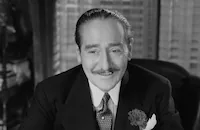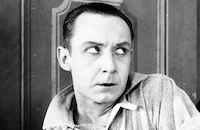I'll Be Yours

Brief Synopsis
Cast & Crew
William A. Seiter
Deanna Durbin
Tom Drake
William Bendix
Adolphe Menjou
Walter Catlett
Film Details
Technical Specs

Synopsis
Fresh from the small town of Cobbleskill, young Louise Ginglebusher arrives in New York City. Hungry and on a budget, Louise enters a café, where her order is taken by Wechsberg, her kindhearted but contentious waiter. Feeling sorry for the girl, Wechsberg brings her a turkey sandwich rather than the chicken liver she ordered. While Wechsberg confers about his taxes with his bearded attorney, George Prescott, Louise eyes the bewhiskered barrister. Noticing Louise's interest, Wechsberg introduces her to George and when the waiter learns that her last name is Ginglebusher, he insists that she take George's business card in case she ever decides to change it. After George leaves, Wechsberg sighs that his friend is too honest to earn a decent living. From the café, Louise goes to see Mr. Buckingham, the owner of the prestigious Buckingham Music Hall and an old friend of Louise's father. Buckingham hires Louise as an usher, and while working one day, she meets Wechsberg again when he comes to smoke and watch a movie. Later, as Louise leaves work, she is accosted by a masher. Spotting Wechsberg in the street, Louise claims that he is her husband and dismisses the young man. Wechsberg then walks Louise to her boardinghouse. As they sit on the front porch and discuss their dreams, Wechsberg impetuously invites Louise to an elite social gathering at the Savoy Ritz, at which he is working the following night. When Louise appears at the event in a borrowed gown, Wechsberg advises her to pretend to be a foreigner and mingle. The headwaiter soon discovers that Louise's name is not on the guest list, but Wechsberg claims that she is one of the entertainers. After sitting down at one of the tables, Louise is joined by J. Conrad Nelson, an elderly, philandering meat magnate. When Nelson, the party's host, begins to question Louise, Wechsberg tells him that she is there to perform and Nelson then asks her to sing. To save Wechsberg's job, Louise sings and so impresses the audience that Nelson insists she accompany him upstairs to his penthouse. Thinking that Louise is an aspiring young singer who has crashed his party to attract his attention, Nelson offers to star her in a musical. To discourage his attentions, Louise declares that she is already married, prompting Nelson to offer to buy her out of her marriage by financially compensating her husband for his loss. Seeing an opportunity to help the struggling George, Louise hands Nelson his business card and tells him that George is her husband. The next day, Nelson visits George in his shabby storefront office and offers to appoint him his company's legal representative. Suspicious, George thinks that Nelson is misrepresenting himself and dismisses him. Noticing that the lawyer's office walls are plastered with slogans proclaiming the virtue of honesty, Nelson dispels George's reservations by claiming that he needs an honest lawyer as a model for his staff. Soon after, Louise arrives at George's office door, and hearing the two men talking inside, hides in the hallway. As Nelson is about to leave the building, he spots Louise and insists that she come to his apartment the following evening. When Louise enters his office, George thinks that she has come to change her name. Ecstatic that his ethical virtues have finally been recognized, George is sure that fate has sent Louise to him and asks her to join him on his errands. Louise eventually convinces George to shave off his geezer-like beard, revealing a handsome young man. After a stroll in the moonlight, George proposes that Louise change her name to Prescott and declares his love for her. Feeling guilty for deceiving George, Louise demurs, and when George asks to see her the next night after his meeting with Nelson's board of directors, she tells him she already has a date. The next day, Nelson instructs his board of directors to keep George occupied while he romances Louise. At the business meeting, George questions the board's financial proposals and insists upon scrutinizing them further. Louise, meanwhile, enters Nelson's apartment and nervously blurts out that George is not her husband. When Wechsberg bursts into the apartment followed by George, Nelson is convinced that they are all involved in a conspiracy and informs George that he was hired only because Nelson believed him to be Louise's husband. Bitterly disappointed, George departs. Some time later, Nelson comes to George's office and, after informing him that his objections at the board meeting saved the company $200,000, insists that the lawyer honor his contract. Nelson then informs George that he has financed Wechsberg in his own restaurant and invites him to hear Louise sing at the opening that night. George refuses to attend, but as Louise eagerly awaits George's arrival, Wechsberg tries to conceal his absence from her. Just as Louise is about to take the stage to perform, George appears and they embrace in a dance of love.

Director

William A. Seiter
Cast

Deanna Durbin

Tom Drake

William Bendix

Adolphe Menjou

Walter Catlett

Franklin Pangborn
William Trenk
Joan Fulton
John Phillips
Patricia Alphin
William Brooks
George Chandler

John Hamilton
Tom Dillon
Lorin Raker
Charles Miller
Richard Abbott
Joseph Granby
Cyril Delevanti
Ida Moore
Nancy Brinckman
Ethel May Halls
Dudley Dickerson
Stanley Price
Brad Slaven
Thomas M. Skinner
Johnny Michaels
William Norton Bailey
Don Garner
Ralph Brooks
Doug Carter
Steve Wayne
Daral Hudson
Jack Wagner
Dick Dickerson
James L. Kelly
Hallene Hill
Beatrice Gray
Michael Stokey
Helen Wallace
Laura Treadwell
Martha Montgomery
Crew
Lawrence Aicholtz
Travis Banton
Jack Brooks
Howard Christie
Catherine Chisholm Cushing
Carmen Dirigo
Charles Felstead
Russell A. Gausman
John B. Goodman
E. P. Heath
Bernard Herzbrun
William Holland
David S. Horsley
Felix Jackson
Felix Jackson
Emmerich Kalman
Joe Lapis
Augustín Lara
Otto Ludwig
Hal Mohr
Jack P. Pierce
Al Procter
Walter Schumann
Walter Schumann
Frank Skinner
Preston Sturges
David Tamkin

Film Details
Technical Specs

Articles
I'll Be Yours
By the late 1940s, either the quality of her pictures had dropped steeply or the public was growing weary of her wholesome image, despite efforts to tweak it toward more sophistication with productions like the film noir Christmas Holiday (1944) and the thriller Lady on a Train (1945). One thing was certain - Deanna Durbin was tired of the roles she was getting and even more of life in the spotlight. I'll Be Yours was the first of her last four pictures, all of which she described in a rare 1983 interview as "terrible." After her final film, For the Love of Mary (1948), she kissed it all goodbye walking away from Hollywood forever at only 27 years old. "I couldn't go on forever being Little Miss Fixit who burst into song," she reportedly said later.
I'll Be Yours had a long history. The original 1930 stage version of the story, A jó tündér , was written by Hungarian playwright Ferenc Molnár, whose works were the basis of a number of hit Broadway and Hollywood productions, among them films starring Lunt and Fontanne (The Guardsman, 1931), Joan Crawford (The Bride Wore Red, 1937) and Grace Kelly (The Swan, 1956) and the musical Carousel (1956). The play was translated into English as The Good Fairy by Jane Hinton and premiered on Broadway in 1931 starring Helen Hayes. William Wyler filmed it under that title in 1935 with his soon-to-be wife Margaret Sullavan. Durbin herself performed in a radio version in 1944. It must have seemed like a good idea to turn it into a comedy with music for her, even though, as reviewers pointed out, this version removed the fantasy elements Molnár had written in. The New York Times called it "at best just a pleasant diversion," while conceding what Durbin's fans today still find to be true, "her vast and appealing girlish charm."
The screenplay was adapted by German-born Felix Jackson, who was Oscar-nominated for Bachelor Mother (1941), and wrote Destry Rides Again (1939) along with the Margaret Sullavan-Charles Boyer version of Back Street (1941). Jackson was Durbin's husband at the time and father of Durbin's first child. He also produced this movie, as he had six other Durbin vehicles, and he wrote three other screenplays for her.
William Seiter had already directed Durbin in It's a Date (1940) and Nice Girl? (1941) and would direct her penultimate picture Up in Central Park (1948).
I'll Be Yours was in production from August to October 1946, with some background footage shot on location in New York. It was released the following February with the tagline, "Heaven protects the working girl, but who protects the guy she's working to get?"
Director: William Seiter
Producer: Felix Jackson>br> Screenplay: Felix Jackson, based on the screenplay The Good Fairy by Preston Sturges, based on the play by Jane Hinton, adapted and translated from a play by Ferenc Molnár
Cinematography: Hal Mohr
Editing: Otto Ludwig
Art Direction: John B. Goodman
Music: Frank Skinner
Cast: Deanna Durbin (Louise Ginglebusher), Tom Drake (George Prescott), William Bendix (Wechsberg), Adolphe Menjou (J. Conrad Nelson), Franklin Pangborn (Barber)
By Rob Nixon

I'll Be Yours
Quotes
Trivia
Notes
The film's writing credits read: "Adapted by Felix Jackson from the screenplay "The Good Fairy" by Preston Sturges, based on a comedy by Ferenc Molnár." Sturges' 1935 Universal film The Good Fairy, directed by William Wyler and starring Margaret Sullivan and Herbert Marshall, was also based on Molnár's play (see AFI Catalog of Feature Films, 1931-40; F3.1678). I'll Be Yours was producer Felix Jackson's last film for Universal. According to an October 1946 Hollywood Reporter news item, background scenes for the film were shot on location in New York. On January 23, 1950, Lux Radio Theatre broadcast a radio version of Jackson's story starring William Bendix and Ann Blythe.














